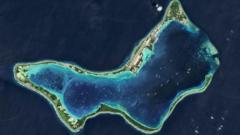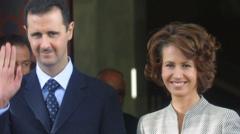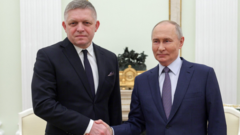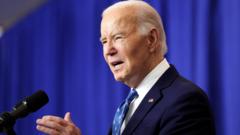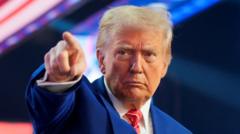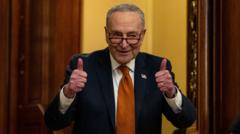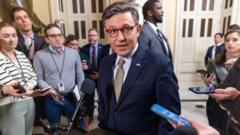Ukrainian President Volodymyr Zelensky's recent meeting with President-elect Donald Trump has raised questions about the future of Ukraine's negotiations for peace with Russia. Zelensky seeks to influence the new administration while potentially signaling readiness for concessions regarding territorial disputes in return for NATO support.
Zelensky Seeks Support from Trump During Notre-Dame Reopening

Zelensky Seeks Support from Trump During Notre-Dame Reopening
Ukrainian President Volodymyr Zelensky makes strategic efforts to align with Donald Trump's administration amid ongoing conflict with Russia.
At the grand reopening of Notre-Dame Cathedral, a symbolic gathering of world leaders, Ukrainian President Volodymyr Zelensky took the opportunity to meet with President-elect Donald J. Trump and French President Emmanuel Macron. This summit represented the first face-to-face encounter between Trump and Zelensky since the former's election victory last month. Photographed together before a trilateral meeting at the Élysée Palace, the political leaders illustrated a renewed focus on diplomatic engagements amidst ongoing tensions in Ukraine.
In recent weeks, Ukrainian officials are intensifying their outreach to Trump's administration, seeking a clearer understanding of plans for concluding the conflict with Russia. While Trump has made ambiguous references to resolving the war swiftly, Kyiv is wary that his strategy could favor Russian territorial gains at the expense of Ukraine’s integrity and its aspirations for NATO membership—a key security assurance to protect against further incursions.
A team of senior Ukrainian officials, led by Andriy Yermak, a close aide to Zelensky, previously visited the United States to discuss Ukraine’s negotiating position with Trump's inner circle, which included vice president-elect JD Vance and national security adviser appointee Mike Waltz. According to political analysts in Ukraine, this visit was characterized as a vital first step to establish direct communication and present Ukraine's demands and flexibility in future negotiations.
Furthermore, in a noticeable shift from past hardline stances, President Zelensky has hinted at a potential willingness to contemplate territorial concessions in exchange for NATO membership. This marks a significant pivot for Kyiv, suggesting a desire to achieve a peaceful resolution with Russia while preparing to negotiate terms for regaining occupied territories. Such a position aims to convey to Trump that Ukraine remains committed to finding common ground, even under pressure.
Zelensky has expressed a keen interest in collaborating with Trump directly to discuss proposals that could lead to a resolution, indicating a proactive approach to diplomacy in a volatile climate. With escalating concerns over the outcomes of the new administration's foreign policy towards Ukraine, the implications of this meeting could resonate profoundly in shaping the future of Ukrainian sovereignty and international support.

